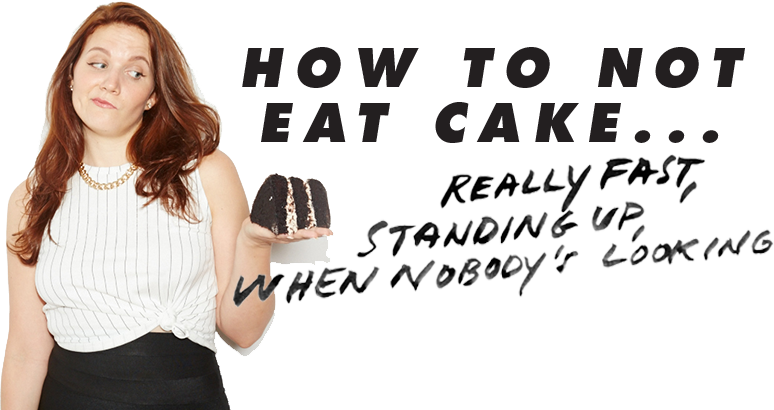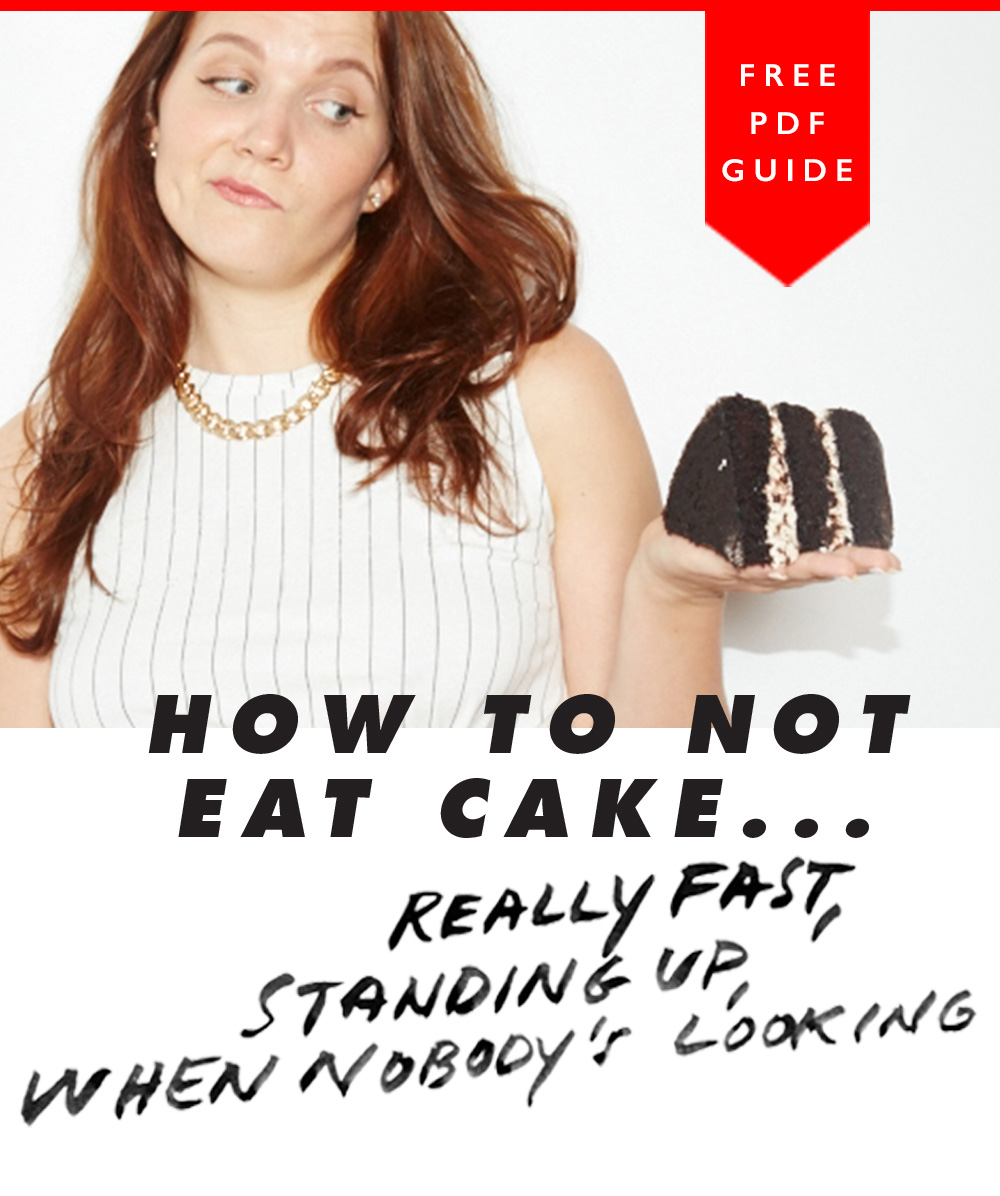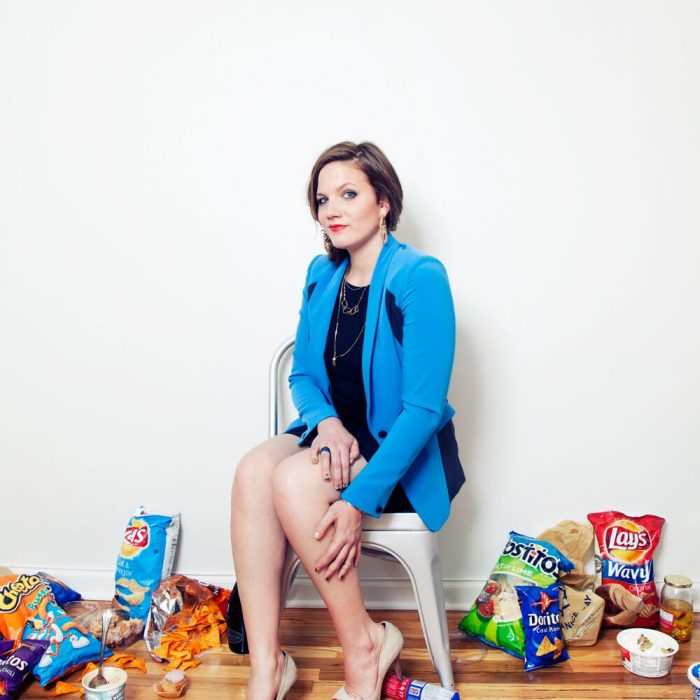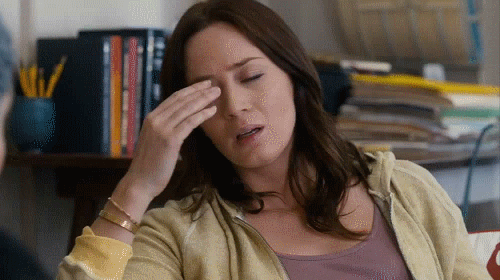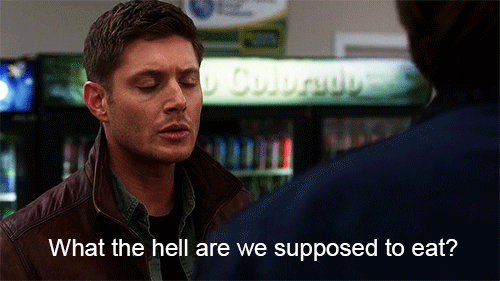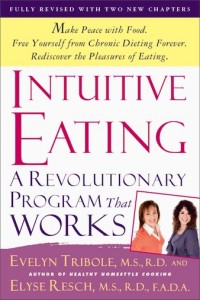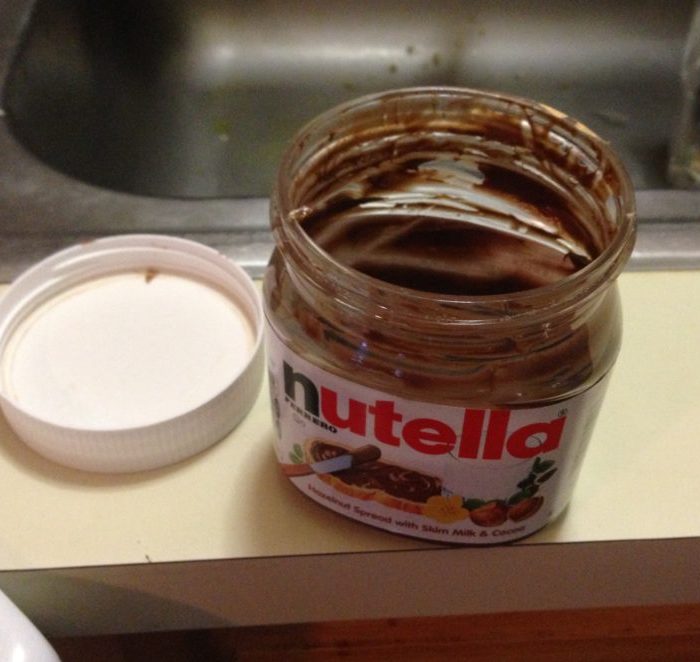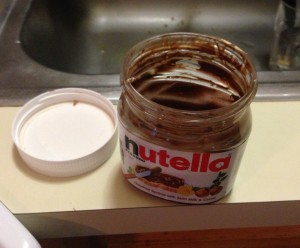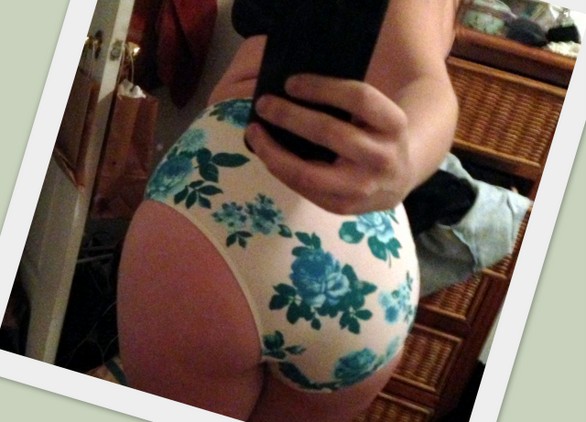Can’t stop binge eating? aka on the diet-binge roller coaster from hell?
I get it, gurl.
Binge eating was my nemesis for YEARS.
I literally used to dig food out of the trash—after throwing it out earlier because I didn’t “trust myself” to be around certain foods without bingeing my face off.

Until I finally understood the root causes of my binge eating (which I’ll get to in a moment), I spent most of my time alternating between periods of “being good” or successfully “controlling myself” around food
…followed by intense bouts of “losing control” around food.
I’d regularly find myself knee-deep in chocolate-covered whatever-the-hell-it-was—swearing I’d get back on the wagon for good starting tomorrow.
Back then, it wasn’t uncommon for me to make myself so full and sick from eating that I could barely get up from my couch…let alone go out with my friends, be productive at work, put on real pants, etc.
I was a “low-bottom” binge-eater and tried everything to stop—from 12-step groups to “food addiction” programs…I even had a 45-day inpatient rehab stint for Binge Eating Disorder…only to find myself bingeing my face off again within a couple of days of being released.
How to Stop Binge Eating: Understanding Why You Binge Eat
For the most part, all of the various programs I tried to stop binge eating suggested that binge eating was a self-contained psychological defect—the result of a “spiritual malady,” or bad habit, or perhaps some childhood trauma.
In other words, they all suggested that if I could just fix the underlying emotional problems that “triggered” binges, I would be healed.
Doing everything in my power to get this problem “under control,” I went to therapy, I went to church, I journaled, I made up with my mother…and for years, I just couldn’t stop bingeing.
It wasn’t until years into my healing journey, that someone finally suggested that perhaps my bingeing wasn’t just a response to difficult emotions or “neurological junk” in my brain…
perhaps my binges were a natural response to countless years of dieting and feeling deprived around food as a result of innumerable attempts at weight control throughout my life.
The Root Cause of Binge Eating
Despite an enormous amount of effort by the diet industry to suppress research that suggests “diets don’t work,” it is widely evidenced in the scientific literature that binge eating is primarily a symptom of dieting (that is, attempts at food and weight control).
If you’d like to read the pages and pages of research supporting this claim—it will take you a while—but I would start by referencing the literature collected by Evelyn Tribole and Elyse Resch, who are the nutritionists behind the book, Intuitive Eating, (which I’ll discuss later in this post),
as well as the book Health At Every Size by Linda Bacon, which reviews decades worth of research on the most common symptoms and outcomes of dieting and weight suppression. More to come on “Health At Every Size” as well.
This all to say—trying to control binges by restricting foods makes binges worse. You can not stop binges with the very behavior that cause them…and they are 100% caused by dieting, food restriction, and other attempts at food or weight control.
Binge Eating vs. Emotional Eating vs. “Getting Really Full”
The terms “binge eating” and “emotional eating” are often used interchangeably, even though they are actually very different behaviors and need to be treated in different ways.
Since you can’t heal a problem you don’t fully understand, let’s start by defining these terms so we can all make sure we’re talking about the same thing.
I give my definitions of “binge eating” and “emotional eating” in greater length in this free video series…but here’s a quick summary:
What is “Binge Eating?”
I now understand that binge eating is—plain and simple—a reaction to deprivation around food.
In other words,
- it’s eating because you haven’t had a piece of bread in 3 weeks and you can’t hold yourself back one-second longer (that is, a biological instinct to relieve oneself from food restriction—aka “falling-off-the-wagon eating”)
- or it’s eating because you already screwed up, so you “might as well” finish the bag and start over tomorrow (aka “last supper eating”).
This type of eating can also be triggered by unhealthy attitudes about food and weight—aka “Diet Mentality.”
For instance, people who feel guilty or fearful about eating certain foods are much more likely to binge-eat or feel “out of control” as they judge, analyze or criticize their choices with food.
This all to say that binge eating is NOT a stand-alone or self-contained behavior—it is simply one part—the second part—of the diet-binge cycle.
As such, attempts at “self-control” around food are not only unproductive in managing binge eating, but may actually be the primary risk factor for binge eating and Binge Eating Disorder (BED). More on this here.
What is “emotional eating?”
“Emotional Eating,” on the other hand, is eating for emotional pleasure or to soothe uncomfortable feelings.
A “normal” eater may eat emotionally from time to time, but will likely do so far less often than dieters and restrictors, for reasons that I explain here.
That being said,
the reality is…most people eat emotionally sometimes…
As my friend Wendy Shankar says,
“there are only 6 people who eat food righteously as fuel and nothing else…and all six of them are Kenyan marathon runners.”
The difference between a person who has a bowl of ice cream after a hard day, and the person who flies off the handle into a week-long binge…
is whether or not they were trying to “control” their food and weight to begin with—is whether or not they struggle with diet-mentality around that experience.
Folks who are not emotionally attached to “being good” around food—that is, folks who are not on a “wagon” around food—will not “fall off the wagon” when they eat emotionally. Dieters will…and “falling off the wagon” is ALWAYS more intense than an easy bowl of ice cream to self-soothe.
Additionally…
Binge Eating is NOT the same thing as “getting really full”
Despite conventional wisdom—it is completely un-useful (and actually quite problematic) to define binges by volume or amounts of food. More on this in my vid series.
What is much more useful is to define binges by their motivation…by what actually *causes* the behavior, rather than by some arbitrary amount of “this-is-not-okay.”
Ultimately, there’s a big difference between reacting to deprivation (aka bingeing) and eating a bunch on Thanksgiving because your mom’s mashed potatoes are AWESOME.
This sounds like semantics, but it’s really important to remember—
Like “emotional eating,” getting really full sometimes is a normal part of life. Restricting your food choices and then rebelling against those restrictions when you can’t take it anymore doesn’t have to be.
“I don’t think I’m a dieter, but I know that I binge-eat…”
Because “diet” has become a 4-letter word in the Wellness Industry, many of my clients don’t realize they’re dieting unless they’re on Weight Watchers or Atkins or some old school weight loss “program” of some kind.
The reality, however, is that anyone who defines themselves as a “binge-eater” is almost certainly dieting or, at the very least, struggling with diet-mentality. More on this here.
If you’re struggling with binges or extreme “loss of control” around food—you are, by definition, trying to control your food in the first place.
After all—you can’t fall off a wagon that you’re not on. More on this here.
What exactly do I mean by dieting or “restriction?”
There are a couple of definitions of dieting that most often lead to binge eating behaviors:
- A diet may include any attempt to restrict or limit food intake for the purpose of weight loss (or weight “control”)
In other words, a diet may include anything from:
- limiting certain types of food,
- or certain amounts of food,
- or limiting certain eating behaviors
…for the purpose of weight loss or weight control.
If weight loss, weight control, or weight-management is your goal, you are most certainly “on a diet.”
- A “diet” may also mean ANY kind of food restriction to which you feel emotionally attached (whether it be for weight loss, or “health,” or any other possible reason).
For instance, restricting dairy or gluten because you have allergies will not necessarily lead to binge eating in and of itself
…but if you feel emotionally attached to “following” that instruction “correctly,”
if your self-esteem or feelings of emotional security depend upon you “sticking to” your particular definition of “health,”
you will likely find yourself “falling off the wagon,” just like you would any weight-controlling diet.
“Diet Mentality” can also lead to binge eating.
Although physical diets or restrictions around food are the primary cause of binge eating, it takes more than canceling your Weight Watchers subscription to rid your mind of years (and possibly decades) worth of toxic diet-culture beliefs around food—which can also trigger binge eating.
When you start paying attention, you may be surprised by how judgmental you are of your food choices, or how fearful you are of eating certain foods. You may walk around feeling terrified of gaining weight or eating “too much,” all of which can be just as triggering as the diets themselves.
In other words—fear, shame, and judgment of your food choices can themselves trigger binge eating.
When we judge a particular eating behavior as “not okay,” we subconsciously send ourselves the message that food should be restricted in the future, thus sending us back into “last supper mode” around food (i.e. binge eating behaviors).
How to stop dieting…so you can stop binge eating.
Ultimately, the only way to stop binge eating is to *truly* let go of dieting…which is not always easy in a culture that constantly tells you your life’s happiness depends upon you eating (and looking) a certain way.
Fear usually comes up.
Most of my clients ask,
“But if I stop dieting, I’ll just eat and eat and eat FOREVER!” “I’ll never stop gaining weight and Oompa Loompas will pop out of my closet and kill me!”
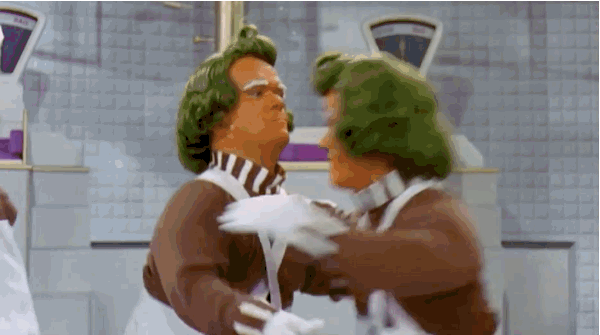
Putting aside that this fear—Fatphobia—is likely the real root of your food obsession, and is certainly not helping you recover from binge eating,
let’s briefly review the reality of the situation:
Dieting makes us feel like there’s no amount of food in the world that could possibly satisfy us—but the reality is, when we’re not constantly depriving ourselves around food—we discover that we are, in fact, satiable.
Satiation is influenced by several factors— including your history of dieting, your current diet-mentality, as well as where your weight currently rests relative to your natural set point weight.
Your set point weight is the weight you naturally arrive after you let go of dieting and eat in accordance with your bodies natural hunger signals.
This weight will be different for everyone—depending on genetics, environment, hormones and other factors.
Whatever your set point weight is—where ever you happen to ‘land’ when you have a healthful relationship with food —is, by definition, the perfect “healthy” weight for YOU.
On that note, below are some basic tips to help you make the transition from diet-binge cycling into “normal,” biologically-attuned eating.
#1 Practice “Intuitive Eating”
Diet Recovery typically starts with a practice of “Intuitive Eating,” or listening to your own biological hunger signals for information about what to eat, instead of external diet plans, etc.
When you tune in and listen, your body knows exactly what it needs to eat at any given time—you just need to start honoring and trusting those signals, which is what a good Intuitive Eating coach should be helping you accomplish.
More on Intuitive Eating here.
#2 Challenge your diet mentality.
While listening to your body’s hunger signals for information about what to eat is super helpful in making sure you get enough food,
be careful not to fall into the trap of the “hunger & fullness diet,” which will backfire just like every other diet on the planet.
At the end of the day, rules and restrictions around food are the real enemies when it comes to binge eating recovery—and practicing “Intuitive Eating” can only go so far if you’re still struggling with diet-mentality around it.
#3 Practice “Health At Every Size”
People who pursue healthy behaviors (like exercising, eating vegetables, etc.)—without worrying or focusing on weight outcomes—are significantly more likely to maintain those health behaviors over time.
Additionally, people who pursue health behaviors in a weight-neutral way enjoy better health outcomes (e.g. blood pressure, blood sugar, cardiovascular health)
…as well as significantly better mental health outcomes, especially around food and body image.
Since there is little-to-no evidence to support forced “weight loss” or diet interventions—because they are rarely sustainable, and often lead to weight gain over time,
there is increasing support for a “weight-neutral” approach to health—citing sustainability and long-term health outcomes as a reason to ditch the scale and focus on taking care of the body you actually have.
I would argue that pursuing health and nutrition in a weight-neutral way is critical for the safety of anyone in recovery from eating disorders, or binge eating of any kind.
#4 Pursue Body Positivity (heal your Body Image NOW)
Letting go of the “goal” of weight loss, and committing to pursue actual health, can be challenging in a culture that regularly stigmatizes people on the basis of size.
We are constantly being fed messages that we are only worthy or lovable in thin bodies, and this can trigger a cascade effect onto our food:
Body Shame → Dieting (and/or Diet Mentality) → Binge Eating
Of course, binge eating often leads to more body shame…and the cycle continues on and on indefinitely.
While many hesitate to work on body-image believing that self-hatred is somehow “motivating” them into thinness,
the truth is, it is VERY difficult to overcome diet-binge cycling (and binge eating in general) without doing significant body acceptance work right off the bat.
The sooner you work to accept the body you have, the sooner you’ll be able to truly let go of dieting and eat “normally” in accordance with your biological hunger signals.
Work with a coach, find a body-positive or body-acceptance support group, do what you need to do to remember:
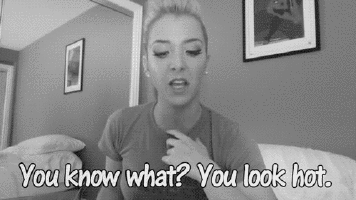
Getting Help for Binge Eating
At the end of the day, binge eating is a reaction to dieting or other attempts to “control” food and weight.
You can think of it like a Bow & Arrow:
The farther back you pull a bow and arrow (aka dieting), the farther that bow’s gonna fly in the other direction as soon as you let it go. More on this here.
If you want to heal your binge eating for real, you’re gonna have to stop straining your body through dieting and other attempts at food or weight “control,” and re-learn to respect and honor your bodies natural instincts around food.
This will also mean learning to respect and honor your bodies natural size, which is different for everyone.
If you’re concerned about the relationship between your weight and health, or are concerned that an anti-diet approach to binge eating recovery won’t work for you because of your size—make sure to check out this blog post about the Health At Every Size approach to binge eating recovery.
In my opinion, there is NO SUCH THING as lasting recovery from binge eating without a weight-neutral perspective.
Binge Eating Recovery Resources
To learn more about the non-diet approach on how to stop binge eating, make sure to check out my free video training series at StopFightingFood.com.
You can also check out my free guide, “How To Not Eat Cake…really fast, standing up, when nobody’s looking” by filling out the form at the top of this page.
Lastly, if this post was useful to you, please share! You can share this post directly to Facebook by clicking here. Easy Peasy.
